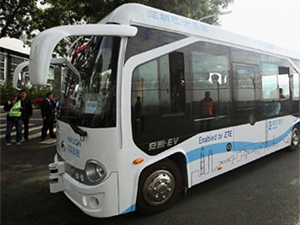



Date:17/12/18
 Prior to the Tokyo 2020 Olympic, Japan has started testing unmanned passenger buses in the Prefecture Gunma, northeast of Tokyo. Such field tests of unmanned passenger buses are conducted in Japan for the first time and are expected to use during the Tokyo 2020 Olympics.
Prior to the Tokyo 2020 Olympic, Japan has started testing unmanned passenger buses in the Prefecture Gunma, northeast of Tokyo. Such field tests of unmanned passenger buses are conducted in Japan for the first time and are expected to use during the Tokyo 2020 Olympics.
At the moment, the route of the unmanned bus is short – only 1 km and the buses themselves move at a speed of 20 km / h. Vehicles are equipped with laser sensors, a variety of cameras, a GPS navigator and the corresponding equipment that automatically sets speed, brakes, and turns. The unmanned passenger buses accurately determine the position of the traffic light and its location on the road relative to other vehicles.
Currently, in Japan, there is no legislation that regulates the use of unmanned passenger buses on the roads. However, a legal loophole was found to conduct such field testing: the bus driver is constantly in his place and is monitoring the situation, ready to take control at any moment.
It is noted that the field trials will continue until March 2019, and practical application on the roads of Japanese cities is scheduled to begin by 2020 when the Summer Olympics will be held in Tokyo. By the same time, local lawmakers will have to create an appropriate legal framework.
Japan Testing Unmanned Passenger Buses
 Prior to the Tokyo 2020 Olympic, Japan has started testing unmanned passenger buses in the Prefecture Gunma, northeast of Tokyo. Such field tests of unmanned passenger buses are conducted in Japan for the first time and are expected to use during the Tokyo 2020 Olympics.
Prior to the Tokyo 2020 Olympic, Japan has started testing unmanned passenger buses in the Prefecture Gunma, northeast of Tokyo. Such field tests of unmanned passenger buses are conducted in Japan for the first time and are expected to use during the Tokyo 2020 Olympics.At the moment, the route of the unmanned bus is short – only 1 km and the buses themselves move at a speed of 20 km / h. Vehicles are equipped with laser sensors, a variety of cameras, a GPS navigator and the corresponding equipment that automatically sets speed, brakes, and turns. The unmanned passenger buses accurately determine the position of the traffic light and its location on the road relative to other vehicles.
Currently, in Japan, there is no legislation that regulates the use of unmanned passenger buses on the roads. However, a legal loophole was found to conduct such field testing: the bus driver is constantly in his place and is monitoring the situation, ready to take control at any moment.
It is noted that the field trials will continue until March 2019, and practical application on the roads of Japanese cities is scheduled to begin by 2020 when the Summer Olympics will be held in Tokyo. By the same time, local lawmakers will have to create an appropriate legal framework.
Views: 423
©ictnews.az. All rights reserved.Similar news
- Azerbaijani project to monitor disease via mobile phones
- Innovative educational system to be improved under presidential decree
- NTRC prolongs license of two TV and radio organizations for 6 years
- Azerbaijan establishes e-registry for medicines
- Azerbaijani museum introduces e-guide
- Nar Mobile opens “Nar Dunyasi” sales and service center in Siyazan city
- International conference on custom electronic services held in Baku
- OIC secretary general to attend COMSTECH meeting in Baku
- Azerbaijan develops earthquake warning system
- New law to regulate transition to digital broadcasting in Azerbaijan
- Azerbaijani State Social Protection Fund introduces electronic digital signature
- Intellectual traffic management system in Baku to be commissioned in December
- Tax Ministry of Azerbaijan started receiving video-addresses
- World Bank recommends Azerbaijan to speed up e-service introduction in real estate
- Azerbaijan to shift to electronic registration of real estate





















